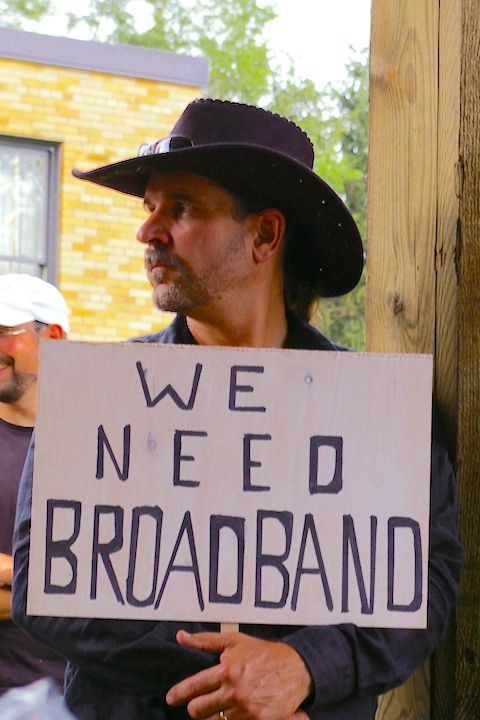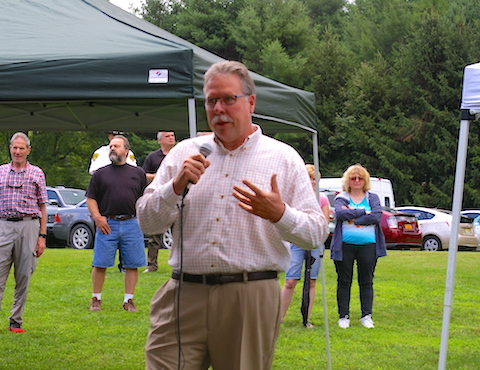
Above: Adam Cross, the code enforcement officer for the town of Lexington, at a "broadband pep rally" held in the town of Lexington in 2015. Photo by Julia Reischel.
The squeaky wheel is not getting the economic grease in the tiny Greene County town of Lexington, much to the chagrin and frustration of Lexington Broadband Initiative co-chairman Bonnie Blader.
Blader has made her exuberance and presence well known in the campaign to eliminate telecommunications dead zones in Lexington, gaining the attention and respect of local, county and state officials. In 2015, she spearheaded a “broadband pep rally” in an attempt to put a spotlight on Lexington’s dire lack of internet connectivity, one of the worst in the Catskills.
At the time, Blader and other local officials hoped that the town would receive $1.5 million in state funding for a project that would lay 76 miles of fiber optic cable to 90 percent of the town’s residents.
But earlier this month, Lexington was left off the list as the NY Broadband Program announced $54.2 million in financial assistance to small telephone and internet providers across the state, including several in the Catskills. (See our related story, “Millions slated for broadband infrastructure in Catskills.”)
The grants were part of an intensive $500 million plan from Governor Andrew Cuomo to modernize the entire state by the end of 2018.
Lexington’s exclusion from the so-called “round one” of state broadband funding came as no surprise. Blader and other officials found out earlier this year that the town would not be included in the first round.
“We weren’t even eligible to apply for any money in round one, which in my mind goes against the concept of connecting the so-called ‘last mile’ areas, like Lexington,” Blader said in a telephone interview.
“We accepted that because we were told it was part of the bigger picture of keeping federal Connect America Funds here in New York, but now we’re hearing we might not be eligible for round two,” Blader said.
“Globally, I understand it and I only know my side of the story, but it feels like we fell into the path of a moving train,” Blader said.
Uncertainty about round two
Uncertainty surrounds Lexington’s inclusion in round two, which was set in motion on August 3 when the round one grants were revealed.
Lexington has entered into an agreement with the Margaretville Telephone Company to provide the infrastructure for internet and cell phone upgrades, contingent upon getting state broadband assistance.
Margaretville Telephone Company General Manager Glen Faulkner, while not critical of the state Broadband Program process, concedes that there is cause for Blader’s consternation.
“Two weeks after round two was initiated, we’re not sure if Lexington will be eligible,” Faulkner said. “It appears they might be but maybe not the whole town. We’re still working through that information.”
A complicated system of using census blocks, a geographic unit used by the United States Census Bureau, is being used to establish eligibility for broadband funds. The system is befuddling even to the experts trying to figure out if Lexington is in or out of the round two loop.
“We don’t have an answer yet. Nobody does,” said Greene County Economic Development, Tourism and Planning director Warren Hart.

Above: Warren Hart, Greene County's director of economic development, speaks at a broadband pep rally in Lexington in 2015. Photo by Julia Reischel.
Hart has been closely involved in Lexington’s effort to get the state’s financial support, which has him walking a delicate line.
“Some of these census blocks can go up one side of a street and not down the other. That’s the biggest challenge for us. We are being given only the census blocks, not actually street-level mappings,” Hart said.
“It was disappointing when it was announced Lexington wouldn’t be eligible for round one. We have to wait and see what happens, but it would be patently unfair if they were ineligible in round two,” Hart said.
Faulkner said that his company is bringing in consultants to sort through and decipher the census blocks, noting that the state is “working at it too.”
“It can be anything from a triangle of grass in the road with a stop sign on it to an area with 130 houses in it,” Faulkner said.
There are other big picture factors impacting the overall process as well, related to territories serviced by Verizon, including Lexington, and the massive merger between Time Warner and Charter Communications, which affects how and where the available money is dispersed.
"Promises made"
Acknowledging that Lexington is a very small fish in that large technological sea, Blader said, “I am not in the political mainstream.”
“I don’t know how it all works, and when I look at the census blocks and the [requests for proposals], the language is very opaque,” Blader said. “It’s difficult when you think you have established some kind of relationship with someone at the state or someone in political office and you have to remind them of promises made.”
“The issue is never new for me, but it always seems to be new for them. They always stay in my memory but it doesn’t seem like I stay in theirs. We’re patient in Lexington, but it’s a tough climb,” Blader said.
Faulkner said that a meeting is being scheduled between providers and the state sometime in the next two to three weeks.
“There is some wrangling on the federal level and other opportunities to serve remote areas could emerge from those talks,” Faulkner said.
“Bonnie is a passionate advocate for her town, but we simply don’t know yet with any confidence what will happen,” Faulkner said.
Full disclosure: Lissa Harris, the publisher of the Watershed Post, is a shareholder in the Margaretville Telephone Company. The business was founded in 1916 by Harris's great-great-grandfather, John Birdsall, and remains in the family. Harris is not employed by the company or involved in its management.
Previous coverage:
"Millions granted for broadband infrastructure in Catskills," August 16, 2016
"Broadband partnership targets rural areas in three Catskills counties," August 7, 2015
Lexington hosts first-ever broadband pep rally, July 21, 2015
In visit to Roxbury, state officials vow faster Internet for rural NY, March 2, 2015
$15 million in grants go to Catskills organizations, Dec. 12, 2014













